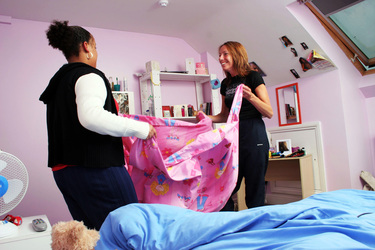By Joe Lepper, Thursday 17 July 2014
Staying Put legislation should be extended into children’s homes as part of sweeping changes needed to improve post-16 support for looked-after young people, MPs have said.
Young people in children’s homes currently have no right to stay after they turn 18.  The education select committee has concluded that allowing looked-after children the right to remain in their care placement until the age of 21 is “inequitable” as it only applies to those in foster care not children’s homes.
The education select committee has concluded that allowing looked-after children the right to remain in their care placement until the age of 21 is “inequitable” as it only applies to those in foster care not children’s homes.
Giving young people in foster care the option of staying put was a key plank of the reforms introduced under the Children and Families Act. In its report, Into independence, not out of care: 16 plus care options, the committee calls on the government to ensure “Staying Put” rights apply to all children’s care settings.
The report says: “Young people living in residential children’s homes are often the most vulnerable and should have the right to remain there beyond the age of 18.”The government is also being called on to look at promoting “staying close” models of care, whereby those leaving children’s homes are offered independent accommodation close to their former care home to ensure they retain access to professional support and friends.
Natasha Finlayson, chief executive of the Who Cares? Trust, one of the charities that gave evidence to the committee, backed the MPs’ findings. She said: “Changing the law so that young people can stay with their foster carers to 21 was a hugely significant and welcome reform, but we must extend this to all children in care to make sure those in children’s homes have the opportunity to benefit from the increased stability and security this can offer them.”
MPs also want an outright ban on the use of bed and breakfast (B&B) accommodation for looked-after children. They say a ban is needed as government guidance around its use for children in care is being flouted by councils. But Cllr David Simmonds, chair of the Local Government Association’s children and young people board, defended the use of B&B accommodation, saying it is only used as a “temporary solution to exceptional circumstances”. He added: “The child’s best interests must always be our central concern and there will be times where emergency placements are required at extremely short notice. We must be careful to ensure that any ban on the use of bed and breakfasts does not leave vulnerable young people effectively homeless due to a lack of temporary accommodation.”
The committee also wants to see regulation of accommodation for looked-after children strengthened beyond care homes, foster homes and schools to cover supported accommodation such as foyers and private housing where support workers make regular visits. The report, the culmination of a six-month inquiry by the committee, paints a damning picture of current support for looked-after children when they reach the age of 16. It says: “Despite strengthened guidance from the Department for Education and more rigorous scrutiny of young people’s readiness to leave care by local authorities, evidence to us suggests that the quality and effectiveness of planning and preparation for a young person’s transition to greater independence is too often inadequate.”
Action for Children chief executive Sir Tony Hawkhead urged the government to act on the committee’s recommendations. He said: “We know that thousands of care leavers are moving out before they are ready, leaving some of the most vulnerable at risk.“
The average home leaving age is 24, yet the most vulnerable young people, some of them only 18 and who are dealing with severe challenges like the legacy of abuse and neglect, emotional and mental health issues, have to manage without support.”
The government has so far resisted calls to extend Staying Put rights to settings other than foster care, although in January, children’s minister Edward Timpson asked officials and the National Children’s Bureau, the Who Cares? Trust and Catch22 to “look at the practical issues of introducing staying-put arrangements in children’s homes over the coming year”. A DfE spokeswoman said: “We have been clear that young people must not be placed in bed and breakfasts unless absolutely essential, and we will take tough action where we find this is happening. “It is our priority to improve the quality of residential care and we have set out our plans to do this. We are working closely with the National Children’s Bureau and the Who Cares’ Trust to look at the practical issues of supporting young people to remain in homes until they are 21.”


